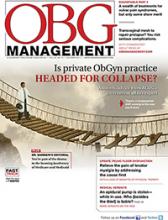“MEDICARE AND MEDICAID ARE ON THE BRINK OF INSOLVENCY, AND YOU’RE NOT JUST A BYSTANDER ”
ROBERT L. BARBIERI, MD (EDITORIAL; OCTOBER 2011)
Health-care reform means fewer dollars for physicians
A great editorial! At last, someone in our field is “getting it” and letting others know the consequences of health-care reform for physicians, including the fact that savings will be attained only by reducing payments to doctors and hospitals. I applaud Dr. Barbieri’s knowledge and honesty.
Regrettably, no politicians are willing to be as forthcoming. The public continues to believe that it can get everything it wants when it wants, and that it will be perfect and cheaper, too! Eventually, physicians and the public will have to wake up to the fact that the health-care system cannot continue the way it is—and the proposed fixes are untenable, too!
In my opinion, universal, basic health care—with options for those who can afford it—will have to be developed and will have to incorporate restrictions (i.e., rationing) of resources based on clinical guidelines. Another proviso: if clinicians adhere to these guidelines, they will be indemnified from lawsuits.
Arnold W. Cohen, MD
Chairman, Department of Obstetrics
and Gynecology
Albert Einstein Medical Center
Philadelphia, Pa
Dr. Barbieri responds Health-care reform “savings” come at a price
I agree with Dr. Cohen that health-care reform is likely to produce “savings” by reducing reimbursements to physicians and hospitals, a plan that is likely to adversely impact the health of patients.
“ IS PRIVATE OBGYN PRACTICE ON ITS WAY OUT?”
LUCIA DIVENERE AND JANELLE YATES (OCTOBER 2011)
Problems in private practice are longstanding
This was a very informative article. I am the husband and practice manager of my wife’s solo ObGyn practice. Eleven years ago, we moved to a small rural community to help provide quality health care to an under-served population.
It is a shame that there is no support from anywhere to help us sustain a viable business. Not only is there a lack of loyalty from employed individuals in the community, but employment taxes, malpractice insurance, supplies and equipment, and recertification and credentialing are too expensive.
Being in private practice is a deplorable position to be in, in the current economic environment in the deep South, and I doubt that it will ever be advantageous to open a solo practice in a rural community as long as this financial climate prevails.
The problems didn’t arise solely with President Barack Obama; they started in President George W. Bush’s second term and declined from that point as private insurance companies lowered reimbursement.
Jeffrey Evans
Baxley, Ga
Private practice is the best way to care for patients
I worked in both large and mid-sized groups before deciding to switch to solo private practice. I know my patients as well as the back of my hand. If Mrs. Smith calls to report a pain, I know who she is, whether the problem is likely to be an emergency, and other details pertaining to her care.
My patients trust me and believe in me. Private practice is the best way to care for patients because no one knows my patients as well as I do. If the government takes the ability to maintain this familiarity away from me, and others like me, it will destroy medicine completely.
Stephanie Singer, DO
Park City, Utah
Let’s not go the way of the airline industry
The Patient Protection and Affordable Care Act seeks to regiment, standardize, automate, and demote the status of medical care. We are told that this will lead to greater patient safety, just as automation in the airline industry improved the safety of flights—a fact used to browbeat doctors and nurses. Now, the airline industry is fighting “over-automation,” and pilots are “forgetting how to fly”; automation now accounts for the majority of serious airline accidents.
We should not stand by idly while our system becomes a standardized computer-automated public health utility designed to save money—lest we forget how to practice medicine.
John Sand, MD
Ellensburg, Wash
No business can survive with fixed reimbursements
There is a simple solution to the challenges faced by physicians in private practice: Insist on payment at the time services are rendered. For the past several years, as reimbursements have declined, physicians in many specialties have begun to opt out of insurance contracts. These physicians have done consistently well. It is senseless to believe that a business can survive without adjusting for escalating overhead expenditures. “Global reimbursements” are emblematic of poor-quality medicine and are supported by physicians who either don’t work hard or devalue the quality of medicine, or both.


